Scott's away this week on a safari. I'm not sure what a Prof G safari looks like, but it likely involves tented camps with fine china, Zacapa, and remote NAD treatments.
In his absence, I'm keeping the lights on. Yes, me, Ed Elson, Scott's 25-year-old co-host on Prof G Markets. I get paid to make Scott appear younger and more relevant, i.e., keep him abreast of trends in business and tech. Plus wardrobe advice - the guy dresses like an aging skateboarder.
This week I'm sharing my thoughts on a long-brewing trend that came to a head in 2024. It's simple: America has fallen out of love with brands and in love with people. This is evident in every corner of American life - from politics and business to technology and media. People are the new brands.
Some context: What I lack in age and wisdom, I make up for in screentime. I spent almost seven hours scrolling the internet yesterday - average for me, below average for my generation. I am a product of the greatest digital transformation in history, and the erosion of traditional brand value is happening downstream of this transformation. Scott concurs. Where our views differ, however, is that while he believes digitally-enabled products and services have replaced brands, I believe people have.
First, some numbers: Gen Z spends an average of 109 days per year looking at a screen. Eighty percent of our waking hours are spent consuming information, up from 40% in 1980. We see 208 ads per hour - 10x more than our parents did at our age. As a result, we are more anxious, distracted, and depressed than any generation in history. We all know this but do not comprehend it. Like frogs in boiling water, we've been slow-cooked by screens.
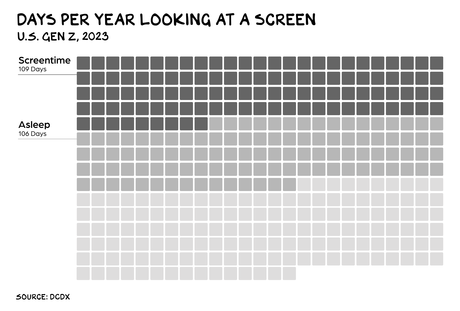
The most important number is 12%. That's the share of Americans who say they have zero close friends, up from 3% in 1990. Meanwhile, half the country says they're struggling with loneliness. These numbers took off when Apple put computers in our pockets, and they've been climbing ever since.
There is an epidemic of loneliness in our country that extends far beyond the lives of Gen Z. We've underestimated its impact - loneliness touches everything, from the media we consume and the products we buy to the relationships we (don't) form. When we reflect on the winners and losers in 2024, we will bucket them into two categories: those who capitalized on loneliness and those who didn't. Moreover, we'll realize that, in this society of lonely people, we find a lot more to love in a person than a brand.
Cravings
Meta naturally insists the loneliness epidemic has nothing to do with social media. Common sense suggests otherwise. We now spend 70% less time with our friends than we did a decade ago. There is no question: The phone has replaced our friends.
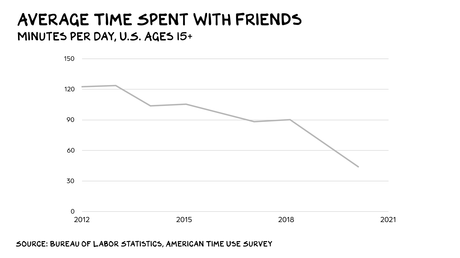
Research shows our bodies are not OK with this. Loneliness has a neurochemical impact similar to that of hunger, in that it activates the same parts of the brain. The longer we go without social interaction, the more we crave it. Interacting with other people is not a human desire but a human need. For the past decade we've starved ourselves of this essential nutrient.
The implication is simple: Whether they know it or not, near everyone you know is craving a friend. The best visualization of this subconscious craving is the internet, which has been overrun by billions of people in search of other people. TikTok is an endless stream, not of landscapes or products or experiences, but people. Same for YouTube, where the highest-performing videos are those with thumbnails featuring a giant human face. Meanwhile, on Instagram, pictures with human faces are 38% more likely to get a like than those without. The algorithm is the truest reflection of our cravings, and the algorithm has been very clear: We crave people most.
For lonely people, however, simply seeing someone is not enough. What we really want is to know them, to understand them, to be familiar with the intimate details of their life and for them to understand us. In other words, we want a friend. Many have watched in confusion the extraordinary rise of online influencers - people who make millions posting videos of their daily coffee routine or workout regimen. Much of this can be explained by our chronic lack of friends. Research shows Gen Z views their favorite influencers in the same way they view their friends. We know what clothes they wear, what food they eat, and what brands they buy. This has radically transformed the retail economy, so much so that 40% of us now consult an influencer before we make a purchase.
Parasocial
The technical term for this phenomenon is "parasocial relationship." Per the Tech & Science dictionary: "a relationship a person imagines having with another person whom they do not actually know." Parasocial is mostly used in reference to Instagram and TikTok. But I believe our parasocial relationships affect everything. If I had to describe 2024 in one word, it would be parasocial.
This is evident in my industry, podcasting. Joe Rogan has become more influential than the world's largest news networks. His podcast gets 3x more downloads than the average primetime viewership of CNN and MSNBC combined. Many have misdiagnosed this tectonic shift as a left vs. right phenomenon, i.e. "CNN is woke/liberal; Rogan is anti-woke/conservative." In the context of loneliness, however, that's a red herring.
The key distinction between CNN and Joe Rogan is that one is a brand and the other is a person. This distinction is embedded in everything, from the name (CNN vs. Joe Rogan) to the logo (red letters vs. a face) to the product ("the news" vs. normal conversation). In a world of chronic loneliness, the person is more compelling. It's no accident the name of our pod is Prof G.
One might argue that Abby Phillip is a person. But this neglects the intimate nature of podcasting as a medium. Abby Phillip reads off a teleprompter, wears makeup and a suit, and sits in a multimillion-dollar production studio. Rogan wears a T-shirt and talks with his buddies in a room that looks like a converted garage. For millions of Americans, Rogan isn't a newscaster or even a celebrity, he's a friend. And you will find this dynamic at all the top podcasts in America. (Side note: I surveyed 10 friends on their preference between Abby Phillip vs. Joe Rogan; none of them knew who Abby Phillip was.)
Beast Mode
Hollywood is suffering at the hands of the same trend. The 2024 Academy Award for Dumbest Purchase goes to Larry Ellison's son, David, who, after getting caught up in a bidding war with the children of two other billionaires, spent $8 billion on Paramount Global. Every character in this transaction suffered from Hollywood Derangement Syndrome, believing the Paramount brand still holds any cultural currency. It doesn't. Meanwhile, they didn't comprehend that Hollywood is up against the same unbeatable enemy that cable news faces: people.
The individual who's levied the greatest damage on Hollywood is YouTuber MrBeast, whose portfolio includes hits like I Survived 7 Days in an Abandoned City and I Built 100 Houses and Gave Them Away. MrBeast has mastered the art of the parasocial relationship. Put simply, he's a friend who gets up to interesting stuff. Last year, MrBeast racked up more than 1 billion hours of viewing time, more than any of the top shows on Netflix. He's one of the millions of YouTubers swinging the pendulum of power away from brands and toward individual people. This trend has been well documented ("the Creator Economy"), but it was ratified this year when analysts valued YouTube at $455 billion. That's 20% more valuable than Netflix, and more than twice as valuable as Disney. Streaming or AI didn't take down Hollywood; people did.
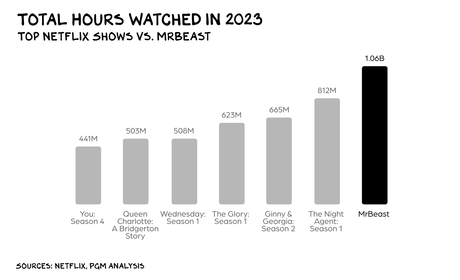
GOPerson
As with podcasting, this presidential election was also less about left vs. right than it was about people vs. brands. No one understood this better than Donald Trump, who doubled down on his parasocial relationship with millions of Americans while actively disassociating from the Republican brand. It was the ultimate people-over-brand strategy.
What drove this home for me was a leaked video of Trump watching the Democratic National Convention with his team. "Too many thank yous," he says about Harris's speech. "Is she crazy?" At first it looks like a watch party, then the tone changes. "Get that out right away," he orders. A staffer types out his exact words, then blasts them across social media channels. Throughout the rest of the speech, Trump live-dictates his thoughts. With each thought, another tweet. The team's job is to publish anything and everything that pops up into his head - no edits or cuts, just the raw Trump.
Call it narcissism or flooding the zone with shit, but what's most striking is Trump's determination to livestream his persona to his followers. He's so determined, he hired someone to type out his thoughts. Think of the millions of lonely people watching that convention, craving Trump's live commentary, perhaps because they share his politics, but almost certainly because they want his friendship.
Now compare this to the Harris strategy of carefully written speeches and manicured interviews. The Harris team managed its candidate the same way a corporation manages its brand. Every detail was consumer-tested. Every message, board-approved. By November 5 it was clear that the candidate was not Kamala Harris but the Democratic Party. She had become a brand, not a person. And, the person won.
Person, Inc.
The corporate world has started to wake up to the power of the person, but the movement was started years ago by Elon Musk. From the beginning, Musk knew he was Tesla's greatest commercial. This is why the company never ran ads. Instead, like Trump, he plastered himself everywhere - at every conference and on every network. His tweeting frequency went from mildly obsessive to clinically insane. He quickly amassed nearly 200 million Twitter followers, then bought the platform. People wonder how Tesla commands a valuation premium 10x greater than its peers while spending only four ad dollars per vehicle sold. The answer is Elon Musk.
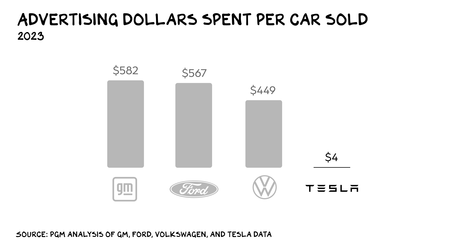
Other companies have picked up where Elon left off - most notably, Meta. Meta's worst rebrand happened three years ago when the company tried to wash away its sins by switching from Facebook to Meta. It didn't work, and brand trust tanked. Its best rebrand, however, came this year, when Mark Zuckerberg went from awkward coat-and-tie-wearing Senate-hearing prop, to gold-chain-donning T-Pain-loving jiu-jitsu fighter. In addition to leaning into his personality, Zuckerberg has made himself more public. He posted 71 Instagrams this year, documenting everything from Taylor Swift concerts to UFC fights. In 2021 he posted just 29 times, mostly product announcements. The extent to which the Zuck has put himself on display this year is astounding. But more important, effective: Since the rebrand, Zuckerberg's favorability score among what was once his most hostile cohort (18- to 34-year-olds) has increased 73%. This is what it means to choose "person" over "brand."
Honorable mentions go to Spotify and Shopify. I've spoken before about the need for CEOs to ditch highly polished press releases and embrace TikTok instead. In line with my belief that people > brands, TikToks show us who is running the company in a way press releases can't. This is starting to happen. Spotify's Q2 earnings update this year came in the form of a short selfie video filmed by CEO Daniel Ek. Shopify President Harley Finkelstein did the same. Memo to CEOs: This is the way to do it. Brands and logos and press releases do not resonate with us anymore. We are interested in your people - who they are, what they care about, and what they have to say - not your brand. The most overvalued firm in tech, Palantir, isn't a tech company, but a CEO (Alex Karp) masking as a public company.
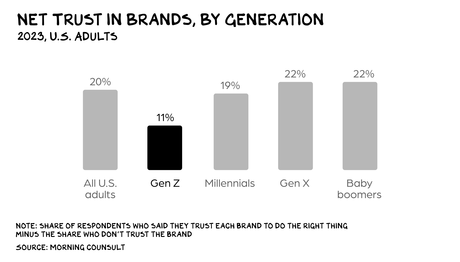
Reality Check
The premise of my argument is more important than the argument itself: We have become a society of lonely people, and our loneliness is permeating everything we do. This is a harrowing truth, and I'm grateful that Surgeon General Vivek Murthy has lent the issue the gravity it deserves by declaring it a national epidemic.
I remind you that more than 1 in 10 Americans today have no close friends. Single-person households now make up 29% of all households - up from 13% in 1960. We are more socially isolated than ever before. These are important facts for businesses to know if they are to understand their customers, but they're also important facts in and of themselves.
Clarence
It's the holidays, which means cheesy movies and trite truisms. I personally find myself increasingly confident that these movies and truisms are correct. This Christmas I'll be watching It's A Wonderful Life, and I look forward to Clarence's always timely reminder to George Bailey at the end of film:
Remember: No man is a failure who has friends.Happy Holidays,
Ed
P.S. If you liked this and want to hear more from me, find me on Instagram, LinkedIn, or X. Or tune in to Prof G Markets.
P.P.S. We'd appreciate your help by taking 2 minutes to fill out this survey. We're trying to understand more about our readers. Thank you.

